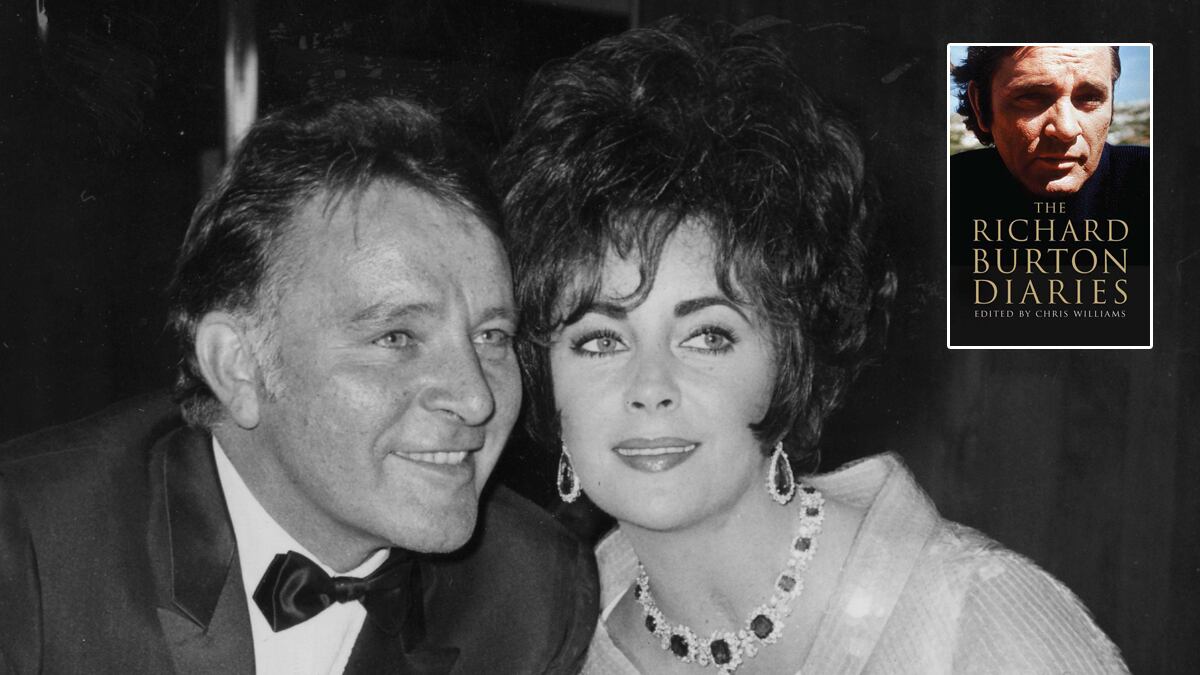Before Brangelina, TomKat, and—god help us!—Kimye, before the culture of celebrity became the instant wind-up machine it now unmistakably is, with supermarket sightings, up-close tweetings, and a glut of red-carpeted appearances, there was one acting couple whose name was synonymous with the ineffable magic dust of star power. They were Richard Burton and Elizabeth Taylor, better known as LizandDick, preferably said in one breath the better to underline their ensorcelled liaison and combined wattage.
From the early sixties, when Burton and Taylor fell scandalously in love (breaking up both their marriages) while co-starring in the movie Cleopatra, on through their eight-year marriage and eventual divorce in 1974, short-lived remarriage and second divorce in 1976, they were the pair to watch. Their every move was dogged by paparazzi and crowds eager to catch a glimpse of them. They were unapologetically high-living and perennially tan, dashing between yachts and luxury hotels, socializing with the likes of Grace Kelly and Bobby Kennedy, buying up jewels and planes, art and houses. In the hands of another couple, their existence might have seemed fulsomely vainglorious, but there was something about their combined magnetism—and, no small thing, their always evident senses of humor about themselves—that kept their glamour and intrigue intact.
The real source of their hold on us undoubtedly lies in the fact that underneath the extravagant surface of their union lay their extravagant passion for each other, clearly visible in photos and documented in the haunting letters Burton wrote Taylor, a sampling of which were included in the 2010 biography Furious Love. Those letters, as well as snippets from his diaries, revealed a Burton who was word-struck as much as he was love-struck, equally passionate about language as he was about Taylor, whose breasts he called “apocalyptic” and whose beauty he termed “pornographic.” The publication of Burton’s diaries—still incomplete but weighing in at over 600 pages—furthers the impression of a man with great literary talent as well as an incisive and relentlessly curious mind. In a television interview with Barbara Walters, done some years after Burton’s death, Taylor referred to Burton as a “genius,” which, I would wager, will not strike anyone who immerses him or herself in these intoxicating journals as much of an overstatement.
ADVERTISEMENT
The diaries have been scrupulously edited by Chris Williams, who also provides an excellent introduction and footnotes which are sometimes helpful but too often clarify the obvious. (Do we really need an explanation of who Christopher Columbus was? Or what Kleenex are?) They officially begin with some 40-odd pages of cursory jottings made by the young Burton in 1939 and ‘40, when he was a chapel-going, exam-“swotting” schoolboy, and then jump to 1960. Here we get some intriguing if brief entries—“I hate myself and my face in particular,” and a description of skiing as “an exotic, romantic and snobby sport”—but the real excitement begins with the more sustained entries that begin in 1965, when Burton is married to Taylor and swanning around with famous people in luxe settings, like Gstaad and St. Tropez.
On Sunday, Jan 3, for instance, he dines with Natalie Wood and David Niven, Jr.: “She emaciated and looks riddled with TB. Pekinese eyes. Sad case.” And on June 8th Burton muses: “It is odd, too, that I almost always think—no condescension intended—of Americans as being gifted and brave but almost always child-like.” The voice is intimate in the way of the best diarists, crackling with vigorous observation and writerly notations: “(Memo write about reaction to fame or lack of it).” We very quickly get a sense of listening in on someone of exceptional attunement who happens to have had access to people and places of uncommon interest, many of whom and much of which he finds wanting.
John Huston is dismissed as a “simpleton” and a “self aggrandizing liar,” Frank Sinatra is no more than “a petulant little sod,” and a fancy, “handsomely appointed” hotel in Puerto Vallarta is rudely sized up as showing signs of wear: “Oddly enough the clientele didn’t look as if they could afford the place, and the barmen were slow and all their white jackets were soiled and sweat-marked under the arms…” The only two showbiz people who escape his generally deflating attitude to his peers are Noel Coward and Mike Nichols, both of whom he deems “’instinctively and without effort and un-maliciously witty.”

Burton marks out his terrain early on: Booze (at one point he refers to his diaries as “confessions of an alcoholic”), food, the allure of Jews, money, politics, celebrity, and its hazards (he characterizes paparazzi as “these butterflies of the gutter”), bouts of boredom, melancholy (“black as a dirge”), and harsh self-evaluation (“I am as dispassionate as it is possible for a human being to be and not be a machine”); the charms and occasional drawbacks of his beloved “old fatty” (one of his many, many nicknames for Taylor) are interwoven throughout. He and Taylor seem to have enjoyed a certain kind of edgy passion, consisting of huge rows in which they hurled insults at each other (“I said that she was not ‘a woman but a man’ and…she called me ‘little girl’), followed by make-up sex. (It must be said, for those who might be hoping otherwise, that there is not much of specifically erotic disclosure here; for such a randy and articulate character, Burton is touchingly shy about bedroom details.)
We hear about actors and acting, as one would expect—“Warren Beatty seems very self-conscious and actory,” Burton notes , “… He doesn’t give that feeling of vibrant power as Rex does or the lethargic dynamism of Marlon”—but what one hadn’t anticipated is the ongoing literary seminar. Burton, it turns out, is a demon reader, as avid as he is discerning, and speedy to boot: “I have just finished a very readable Life of Mussolini, which depressed me so much that I hurriedly re-read Waugh’s Vile Bodies to put me in a good frame of mind for sleep last night.” He thinks nothing of going to a book store on the Via Veneto and buying 20 or 30 paperbacks at a time (including “1/2 dozen detective stories” and a biography of Harry Truman) or of reading Auden’s “latest collection of verse” while waiting on his wife’s hairdresser, Alexandre, to get her ready for a scene. It was a habit inculcated in him as a boy in fairly desolate circumstances: “All the books I read, all the things I learned, all my early furtive shame in one little room by candlelight.” (The 12th of 13th children born to a Welsh mining family, Burton was two when his mother died and was sent to live with an older sister and her husband, the latter whom he came to despise.)
Reading remained a constant pastime throughout his life, whether he was lolling in the sun on a yacht off Portofino or shooting a biopic of Tito in Yugoslavia. “I stayed in the bedroom all day yesterday,” he writes on December 31, 1968, holed up in with Taylor and her children in a Swiss chalet, “and read or rather re-read Schlesinger’s massive tome on JFK. I must have read without interruption including mealtimes and visits to the lavatory for about 16 hours.” While stopping at the Plaza Athenee in Paris in January 1969 he builds “a small library…of about 200 books excluding reference books,” and his comparison of Ian Fleming’s You Only Live Twice and Nathaniel West’s Miss Lonelyhearts is worthy of someone who writes reviews for a living: “West’s books is taut, spare and agonized while the other is diffuse, urbane and empty. West hates himself and postulates a theory that you are always killed by the thing you love, while Fleming loves only himself, his attraction to women, his sexual prowess, ‘the-hint-of-cruelty-in-the-mouth ‘-sadistic bit, his absurd and comically pompous attitude to food and cocktails….”
One cannot help but wondering while reading these intricate, deft musings what would have happened if Burton had lived long enough—and had the necessary focus—to make use of these diaries as the basis for a proper memoir, as he considered doing. Certainly the urge to write was with him well before he met Taylor, and although he protests more than once that his journal-keeping is purely personal, a hedge against his habitual laziness, it is clear that he also flirted seriously with finding a book-project. Convivial as he could be when the occasion called for it—when dining with the Duke and Duchess of Windsor, for instance (Burton’s affection for this displaced pair makes me wonder whether there was more to them than I had previously thought) or the Rothschilds—his native temperament was essentially that of a misanthropic loner, perfectly suited to the solitary occupation of a scribe.
Then again, it’s all too tempting to regard Burton as a man of enormous and unfulfilled promise, whether as a writer or an actor; it was a view he was utterly familiar with, and dismissive of: “The press have been sounding the same note for many years – ever since I went to Hollywood in the early fifties, in fact—that I am or was potentially the greatest actor in the world and the successor to Gielgud Olivier etc. but that I had dissipated my genius etc. and ‘sold out’ to films and booze and women. An interesting reputation to have and by no means dull but by all means untrue….”
Did he believe this or was it the story—virile and unselfpitying, as suited the son of a miner—he chose to tell himself? Perhaps it’s fairer, indeed kinder, to assume that in many ways he lived the life he intended to live. “But don’t let’s be stoned all the time,” he wrote in January 1969. “Let’s have days and days of brilliant clarity, etched and limpid, cool and surgical.” On the evidence of these diaries, between the drinking and idling, there were more than a few of those days, and he their eloquent conjuror.






